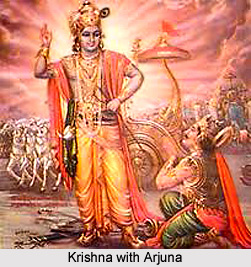 Visit of Lord Krishna to Hastinapur was as an envoy of the Pandavas to persuade Dhritarashtra to restore Indraprastha peacefully to the Pandavas, and thus to avoid war. After the thirteen years` exile was over, the Pandavas once more, by their prowess in battle, revealed themselves to their friends. Dhritarashtra sent an ambassador charged with vague words of peace and friendship to the Pandavas, but he did not convey any definite proposal for giving them back their kingdom and property. After hearing everything from the envoy, all agreed with Yudhishthira that there was only one thing left to be conveyed to the Kauravas. They should be asked to give back Indraprasta or to be ready for a combat.
Visit of Lord Krishna to Hastinapur was as an envoy of the Pandavas to persuade Dhritarashtra to restore Indraprastha peacefully to the Pandavas, and thus to avoid war. After the thirteen years` exile was over, the Pandavas once more, by their prowess in battle, revealed themselves to their friends. Dhritarashtra sent an ambassador charged with vague words of peace and friendship to the Pandavas, but he did not convey any definite proposal for giving them back their kingdom and property. After hearing everything from the envoy, all agreed with Yudhishthira that there was only one thing left to be conveyed to the Kauravas. They should be asked to give back Indraprasta or to be ready for a combat.
The offences of Duryodhana were too many and too persistent. The insults hurled by him during the dice game had been too personal and too offensive. Duryodhana, moreover, had all the opportunity he craved for thirteen years. While his cousins were in exile, he had enjoyed the power of making alliances and dispensing benefits. It was then for him to test the faithfulness and the courage of the friends he had won. The clouds of war hung thick and black above the rival houses, and both knew then that the contest would be to the death. The command of the Kaurava forces were given to Bhishma, while Karna, in order that he might not create a separate faction in the army, opted out of the war till after the grandsire should be slain. The Pandava forces were put under the command of the Panchala prince, Draupadi`s brother, Dhrishtadyumna.
Just before the outbreak of hostilities, Lord Krishna went to Hastinapur to see if it were possible to persuade Dhritarashtra to restore Indraprastha peacefully, and thus to avoid war. Finding his plan becoming not fruitful, and turning to leave the Kuru capital, he had still tried one more device to make the contest impossible. He took Karna aside, and privately told him the secret of his birth, and begged him to announce himself to the whole world as the son of Kunti, and therefore the elder brother of Yudhisthir; not only a prince of blood as proud as the Pandavas` own, but even, if the truth were known, their actual leader and sovereign.
Krishna Meets Karna
Karna listened Krishna with his usual courtesy, not untouched with sadness and told that he knew the fact long ago the nature of his own origin, that Kunti, the mother of the Pandavas, was his mother and the sun his father, and he also knew that it was by the command of the god that she had then abandoned him. However, he could not forget the love and devotion of his adopted parents, the charioteer and his wife. He also told that they had no other child, and that if he gave them up there would be none to make for them the ancestral offerings. He had also married in the caste of the charioteer, and his children and grandchildren were of that rank. Thus he told Krishna that for the mere desire of empire, he cannot cut away these bonds. He was also grateful to his fried Duryodhana who bestowed on him a kingdom for thirteen years without a care. His desire in life had been the right of single combat with Arjuna, and undoubtedly it was the knowledge of this that had made Duryodhana bold to declare war. Thus, he told that if he deserts his friend, then it could be a matter of treachery to his friend.
Karna then told Krishna not to tell the secret of their conversation. They feared if Yudhishthira came to know that Karna was his elder, it was not to be believed that he would consent to retain it. And if the Pandava sovereignty came to the hands of Karna, he himself could do nothing and would then give it over to Duryodhana. It was best, therefore, for all parties that the secret should be as though never told, and that he should act as he would have acted had it remained unknown. Then Karna told Krishna that he knew that truth alone triumphs and that truth would also win the battle at Kurukshetra. However, he was not going for a war, but for a sacrifice for his beloved friend Duryodhana and thus, bade farewell to Krishna and left the place in his own chariot. Krishna returned to the Pandavas after all his attempts failed of stopping the war failed.












